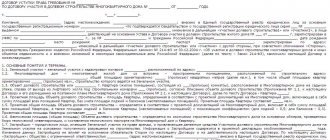3 / 5 ( 17 votes)
The main issues related to creating a family and divorce are regulated by the Family Code of the Russian Federation. In addition, in matters of division of property between spouses, the Civil Code of the Russian Federation and the Code of Civil Procedure of the Russian Federation may be involved. In some cases, federal laws will also be required. For example, Federal Law No. 117 on military mortgages or Federal Law No. 256 on the provision of maternity capital. As well as some by-laws and regulations. Let's take a closer look at how an apartment is divided during a divorce in 2021 and which specific articles need to be appealed to.
Right of joint property of spouses
The RF IC (Article 34) establishes that all property acquired by spouses during the period of marriage is their joint property. These include:
- all income received by the husband and wife for work and any cash payments, except those that have a designated purpose (for example, except for maternity capital and disability pension);
- movable and immovable property that spouses purchased with funds from the common family budget;
- bank accounts, securities;
- shares of enterprises.
Spouses have equal rights to these things. And in case of divorce, they divide them in half. Even if one of them did not work during the existence of the family, but was engaged in housekeeping and children. The rule of common property also applies to property that was purchased with joint money during the marriage, but was legally registered only in the name of one of the spouses.
There is also such a category of things as personal property. It can be purchased during marriage with joint money, but for the personal use of one of the spouses or children: clothing, electronics, musical instruments. Such things are not subject to division in the event of a divorce between spouses. The exception will be luxury items (antiques, jewelry) and fur products.
Also, in 2021, property received under a gift or inheritance agreement cannot be classified as joint property if it was registered in the name of only one of the spouses. Even if this happened during the period of marriage. And also the property that was acquired by everyone before the wedding (Article 36 of the RF IC).
Ownership of a privatized apartment
The rights to an apartment that has become property as a result of privatization are no different from the rights acquired as a result of the purchase and sale procedure, donation or inheritance.
According to Federal Law No. N 1541-1, every citizen of the Russian Federation has the right to participate in privatization if he has permanent registration in the privatized apartment. Its implementation is possible for everyone only once. Those. if a husband or wife previously participated in privatization (for example, parents’ apartments), then they subsequently lose this right. And then the apartment becomes the property of only one of the spouses.
Similarly, the spouse receives sole rights to the privatized living space if the second one issues a legal refusal (it will not have retroactive effect). A minor child also has the right to participate in privatization, even without permanent registration in the apartment being registered, on the grounds that it is being privatized by one of his parents.
How to divide an apartment during a divorce if it was privatized by the husband.
When drawing up most contracts (except for those created at the dawn of the signing of the law), each participant is allocated a share in the apartment. On its basis, during a divorce, the property will be divided.
Rights of former spouses to privatized housing
Privatization is a transaction of donating real estate between the state and a citizen. All participants in the transaction are entitled to the rights to the received property. If the spouses were registered in an apartment given to them by the state on the basis of social rent, and managed to privatize it before the start of the divorce process, then the living space will be in shared ownership. Those. during the division, each of the people registered on the privatized area has the right to count on equal shares.
If during the privatization process the owner of the property is determined to be a single person, and the second spouse has not indicated a desire to participate in privatization or already has privatized property on his account, after the divorce only one spouse remains the owner of the living space - the one in whose name the privatization was registered.
note
If a spouse who has not expressed any intention to be involved in the privatization procedure is registered as registered in a privatized apartment or house, he retains ownership of part of this apartment and the right to live in it. The right is lifelong. This fact can only be changed by a court decision.
If the second spouse is not listed as registered in a privatized apartment or house, then he does not retain any rights to living space after a divorce.
When the living space had already been assigned before the start of the marriage, and after it one of the spouses moved into the agreed upon apartment or house, the rights to housing after the divorce are retained by the spouse who was legally the rightful owner of the apartment before the start of the marriage. In such circumstances, even a child born in marriage does not receive the right to privatized living space.
If there is a child in the marriage
The Family Code (Article 60) establishes that a child has no right to the property of his parents. Likewise, parents cannot claim the property of their children. Based on these provisions, the presence of a child in the family will not affect the division of property in any way. This means that if it was acquired during marriage and is jointly acquired, it will be divided in half, provided that the marriage contract or settlement agreement on division has not established otherwise.
If minor children own property (for example, they got a share in a privatized apartment), then it is not divided between the parents. A different order cannot be established either by agreement or contract. This property is subsequently disposed of by the parent with whom the child remains after the divorce, and only with the consent of the guardianship and trusteeship authorities.
There is only one option when the court can deviate from the rule of equal shares in the division of joint property in the presence of a minor child. It is possible during the division of housing (Article 39 of the RF IC). If the parent with whom the child remains has a much worse financial base compared to the second, then he may be allocated a larger share in the apartment. But according to a court decision, the spouse (or husband), and not the child, will receive ownership rights to it.
If the owner is a husband, but the property was purchased during marriage
It so happens that property is acquired during marriage with common money, but only the husband is noted as its owner in the documents. This situation does not mean that only the husband has property rights. If the property was not acquired before marriage, received as a gift or by inheritance, then the issue of division is resolved in favor of both spouses.
In this case, the wife does not need to look for evidence that the property was purchased with common money. It is enough to present in court a marriage certificate and documents confirming ownership rights. If the terms coincide, then such property is considered jointly acquired during marriage, which means, according to the RF IC, it will be divided in equal shares between the spouses.
If the second spouse is registered in the apartment
If real estate was acquired by one of the spouses before marriage, received as a gift or as an inheritance, then such an apartment during a divorce in 2021 will remain the property of this spouse. It so happens that the owner-husband registers his wife in his living space during marriage (or vice versa). In such a situation, after an official divorce, the spouse who is not the owner is required to submit an application to the passport office and be deregistered. If he does not want to do this voluntarily, then the issue can be easily resolved through the court (Article 31 of the RF Housing Code).
If there is one owner in the apartment, is it necessary to divide the property?
Not really
The only negative point that can await the owner is that if the ex-wife does not have housing to which she could move, the court may decide to grant her the right to live in the apartment until she finds suitable living space for herself (but maximum six months). If, in the same situation, the couple has a minor child, then the court may make a decision granting him the right to live in the apartment until he reaches adulthood, and with him the mother. Provided that the court rules that the child remains with her.
If the apartment is not privatized
If the apartment is not privatized, it is the property of either the state or the municipality, and only bodies/organizations authorized by them exercise the rights of the owner to such housing.
According to Art. 60 of the Housing Code, such housing is occupied by users under a social tenancy agreement.
Under such conditions, even if the spouse received housing under the contract, he has the same rights as his wife and children, and has the right only to own and use it, without the right of disposal. It does not matter who was originally included in the contract - the concept of a responsible tenant has long lost its meaning.
All living family members must be included in the social tenancy agreement, and according to Part 4 of Art. 69 of the Housing Code of the Russian Federation, if users cease to be a family (for example, upon divorce), this does not affect their residence in the occupied housing.
Thus, the wife, even after a divorce, has the right to use the living space.
It is important that with the consent of the persons living together with him, the tenant has the right to accommodate not only members of his family, but also other persons (for example, a common-law wife, if the marriage is civil). But no one’s consent is required to settle with the parents of their minor children (Article 70 of the Housing Code of the Russian Federation).
If the owner is the wife
Russian legislation, when vesting citizens with rights and responsibilities, does not take into account gender differences. Therefore, for the division of property during a divorce, it does not matter who owns it - the wife or the husband. Those. if the spouse bought it or it was given to her or received as an inheritance, then such property will remain her property. In jointly acquired property, without a serious reason, she will also not be allocated any special part, but everything will be divided equally between both spouses.
The head of the legal department, Vladislav Frolov, answers:
You are cohabiting with a man without being officially married; therefore, you do not have jointly acquired property. In whose name the apartment will be purchased, it will belong to him. Moreover, you have all the evidence that your cohabitant did not invest personal funds in purchasing housing.
I do not advise you to enter into an official marriage during the mortgage repayment period, since then it will be considered that you paid the loan from the joint budget. And then your man’s daughter from his first marriage, in the event of his death, will claim part of his share in this apartment.
If your partner's marriage to his first wife is officially dissolved, she will not have any rights to his inheritance. If not, then, along with their daughter, she will be considered the heir of the first priority and in the event of his death will also claim his inheritance.
I will also note that a will also does not always save the situation, since there are a number of persons who have the right to an obligatory share in the inheritance even in the presence of a will. These are people of pre-retirement age; persons who have reached retirement age; minor children; disabled people.
Therefore, buy an apartment, but if you decide to officially marry your partner, enter into a marriage contract, which will indicate that the apartment you are buying is only your property. A marriage contract can only be concluded by a notary.
Can my children apply for an apartment?
450 thousand for a mortgage for 3 children. Is it real?
Division of property if both spouses are owners
After being married for many years, spouses acquire a large number of things and buy real estate. If money from the family budget was used for acquisitions, then both husband and wife are the owners. The division of such property during a divorce is usually the simplest.
For this, the law defines two ways:
- Divide through court.
- Make a division by mutual agreement.
If the spouses agree on the distribution of ownership rights to property, then they can settle them without the intervention of judicial authorities. To do this, you need to draw up a separation agreement. This document regulates the distribution of ownership rights to jointly acquired property. The RF IC allows you to sign it both during the existence of the marriage and after the wedding.
The agreement must be certified by a notary. Such an agreement does not allow for the redistribution of ownership rights to personal property. To do this, you will have to draw up a gift agreement.
Property rights can be redistributed to any property, even not yet acquired, if a marriage contract is drawn up. But spouses can sign it only before the wedding and during the existence of the marriage. After a divorce, this is prohibited.
If the spouses cannot reach an agreement regarding the property, then they have the right to file a claim for division in court. Provided that the amount of claims is less than 50 thousand rubles, a statement of claim should be filed in the magistrate’s court, and if more, then in a court of general jurisdiction. You should contact the authority at the place of residence of the defendant. If for some reason this is impossible, then at the location of the property that is subject to division.
On our website you can see a sample statement of claim to the court for the division of a privatized apartment by spouses during a divorce.
Judicial practice shows that the division of joint property, as a rule, occurs in equal shares between spouses.
Options for resolving the situation with the couple’s common property
The current Family Code, or more precisely, its 34th article, is unambiguous on the issue of determining ownership of an apartment after a divorce. If real estate was acquired during marriage, then it is the common property of the husband and wife and, like all other joint property, must be divided between the spouses in equal shares. The fact that the wife is the owner of the apartment does not change the situation; the husband’s rights during a divorce remain unchanged if the square meters were purchased from common income.
The joint property of the spouses is everything that was purchased during the marriage from the couple’s family budget, and it does not matter at all to whom exactly the ownership of the residential premises is registered - the second spouse must receive exactly half.
The law is the law, but physically dividing an apartment after a divorce is not so easy, especially if we are talking about a small space purchased on credit. In reality, housing can be divided in several ways.
Drawing up a marriage contract
According to such a document, which can be drawn up by a married couple at any time in their family life, it is possible to determine in advance how the goods acquired over the years of family life are to be divided, who will receive real estate, cars and other expensive things in the event of separation of husband and wife. The prenuptial agreement can include both existing real estate and property that the spouses only intend to buy.
If, according to a marriage agreement, the ownership of an apartment acquired during marriage belongs to the wife, then the spouse does not have the right to claim square meters. According to the law, a marriage contract can be challenged in court, but this is quite difficult to do in practice - evidence will be required that the document was signed by a party who is insane or under duress.
Voluntary agreement between husband and wife
Another way to divide acquired property between a husband and wife is to sign a voluntary agreement on the division of property. The parties can resort to such a solution both in case of divorce and while married. According to the rules, in a document certified by a notary, a husband and wife can write down one of the options,
In what cases is an apartment not divided during a divorce?
The law establishes that in some cases an apartment will not be divided between spouses, even if it was acquired during marriage. These include:
- the apartment was purchased by one of the spouses before marriage and during the existence of the family no significant funds from the family budget (for example, for repairs) were spent on it;
- the property was purchased entirely with the personal money of one of the spouses, for example, that which he received from the sale of his own property;
- housing became property under a gift or inheritance agreement;
- the apartment was registered as a military mortgage, and all payments on it were made by the state without using funds from the family budget.
In some cases, the court will not divide the apartment, but may make a decision according to which the owner will be obliged to pay monetary compensation to the spouse.
Provided that joint money was invested in this property not to purchase it, but to improve it. When spouses divorce in 2021, property is divided in two main ways: with the involvement of the court or by mutual consent. There are several categories of property that are not subject to division.










